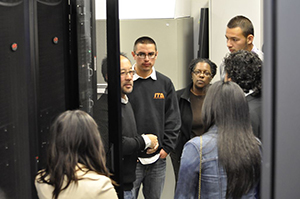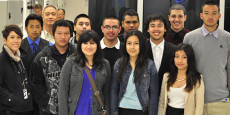Kennedy High School Students Look at Careers in Computing and Networking
March 20, 2013
Contact: Jon Bashor, Jbashor@lbl.gov, +1 510 486 5849
As part of Berkeley Lab Computing Sciences' ongoing outreach efforts with the Kennedy High School IT Academy in Richmond, 11 students and two teachers spent half the day March 20 learning about different career opportunities in computing and networking. The event was organized to give the students ideas about career paths beyond the basics of computer science and web design taught in the classroom.
Andy Nonaka of the Center for Computational Sciences and Engineering talked about "Using Math to Blow Up Stars" in which he described how he uses his applied math skills to create detailed simulations of supernovae, as well as other complex phenomena. He made a point of saying he still relies on math skills he learned in high school.

Gary Jung of Berkeley Lab's IT Division gave the students a tour of a computing machine room.
"I liked the supernova presentation because I didn't know anything about it until then," said junior Angel Palacios. "This was also a good experience because of the workers taking their time to tell us what they specialize in and what it takes to get there, which helps us understand all the options we have if we decide to work in this field."
Cody Rotermund, who recently joined ESnet from NERSC, gave an overview of the supercomputing center and high speed network, explaining how they advance scientific research.
Daniela Ushizima opened the students' eyes with a presentation on scientific visualization, taking them from the basics of how our eyes perceive images to how visualizations are created, then capped off her talk with a series of visualizations.
Eric Pouyoul of ESnet admitted up front that he was a high school dropout in France, but taught himself how to repair trashed electronics to resell and worked his way into several rewarding careers. He also led the students on a tour of the ESnet equipment room.
Gary Jung of IT's Scientific Cluster Support Group showed the students around his machine room, where the combined computing power exceeds 22,000 processors. For many of the students, this was the first time they had been in a data center or seen cluster computers.
Jay Krous of the Computer Projection Program caught their interest with his talk on cyber security, telling students that with billions of people in the world, computer systems are always under attack, whether the motivation is fun, financial gain or national interests.
Krys Simon, who teaches computer science at Kennedy, said afterwards that the talks were both at the appropriate level and covered topics of interest to the students.
"My experience at Berkeley Lab yesterday was very interesting, it opened my eyes to other opportunities that we have," wrote Kennedy's Markie Phanh the following day. "It also helped me understand what I need to work on before becoming a computer engineer. Thank you again for a great day!"
About Computing Sciences at Berkeley Lab
High performance computing plays a critical role in scientific discovery. Researchers increasingly rely on advances in computer science, mathematics, computational science, data science, and large-scale computing and networking to increase our understanding of ourselves, our planet, and our universe. Berkeley Lab’s Computing Sciences Area researches, develops, and deploys new foundations, tools, and technologies to meet these needs and to advance research across a broad range of scientific disciplines.







 Instagram
Instagram YouTube
YouTube